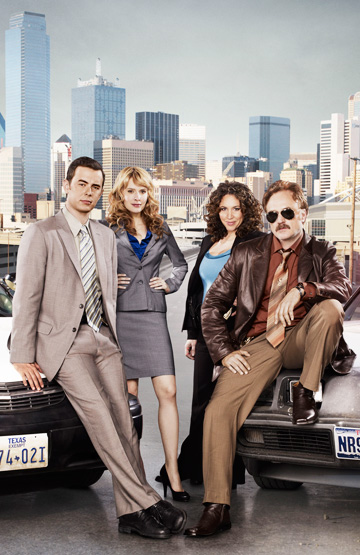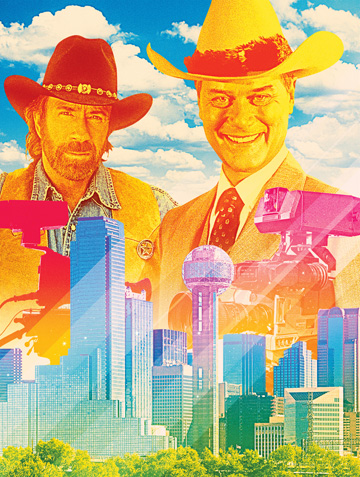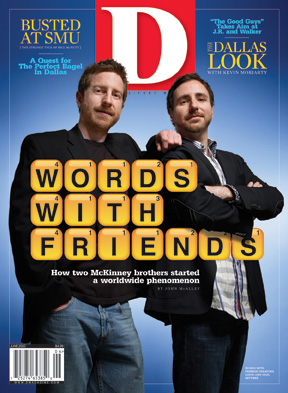Colin Hanks is sitting on a metal folding chair inside Fair Park’s Centennial Hall, absentmindedly playing with a gun, promising me Dallas will be safe. Squared away in a sober gray suit and dark tie, he racks and re-racks the slide of a service-issue 9mm, occasionally ejecting the magazine—a recently developed tic he doesn’t seem to be aware of. He’s an actor—the son of Tom Hanks, American treasure, for crying out loud—and the gun is unloaded. Still. You pay attention to a man with such a casual and intimate relationship with a firearm.
“It’s kind of become a vital part of it,” Hanks says. We’re talking about the role the city will play in The Good Guys, the new FOX action-comedy series set and shot in Dallas. Hanks plays Detective Jack Bailey. “The way I see it, Dallas is going to end up sort of becoming a character within the show. The first conversations I had with [creator and executive producer] Matt Nix, I said, ‘So, we’re shooting in Dallas. Is it Dallas for Dallas?’ And he said, ‘Yeah. But it’s not going to be all cowboys. We’re going to show Dallas for what it is, which is a big, bustling, metropolitan city.’”
It’s comforting to hear Hanks say that, because there are a few signs here that had me worried. The cast of The Good Guys has assembled at Centennial Hall to fulfill the duties of being the cast of The Good Guys: meeting the press, endless setups for promotional photos, and so on. The show films a few hundred yards away, on a soundstage built inside the Food & Fiber Pavilion. A curious array of props is scattered near one of the photo backdrops, where Hanks is running through a series of poses. A pair of longhorns rests on a rolling cart. A few steps away, two armadillos are huddled in pet carriers. Stacked on top of the pet carriers, absolutely inexplicable in their presence here, are paintings of Val Kilmer in his Tombstone cowboy getup, ready to be someone’s huckleberry.
The “Texas” props were mildly disconcerting. What really scared me was the jacket. A crew member had hung his leather-sleeved letterman’s coat on a chair. Embroidered across the back were the chilling words: “Walker, Texas Ranger 100 Episodes.”
Those 100 episodes (and the other 96 they filmed before calling it a day in 2001) might have helped the economy of the local film and TV community, but they permanently disfigured Dallas’ image. In fact, the city has never had much luck with its portrayal on the small screen. Dallas elevated the city’s profile globally but then swallowed it whole; in the end, Dallas had an identity, but Dallas did not, left behind in J.R. Ewing’s soapy wake. Then Norris’ titular lawman reduced the bulk of North Texas to a boot-scooting caricature.

It will help, obviously, if the show is a success. And—on paper, at least—there is a good chance of that happening, with The West Wing’s Whitford on board as star and producer, Nix (fresh off the success of USA’s spy series, Burn Notice) at the helm, a prime sneak preview slot on May 19 before the American Idol juggernaut, and the fact that it’s not airing on NBC. Give it a few seasons, and The Good Guys could redefine how the television-viewing world sees Dallas. It has already changed how the man who wrote it sees the city.
“I was really pleasantly surprised when I came here,” Nix says. “I realized, kind of belatedly, that when I pictured Dallas in my head, I’d been picturing Houston.”
===“I was really pleasantly surprised when I came here. I realized, kind of belatedly, that when I pictured Dallas in my head, I’d been picturing Houston.” — The Good Guys creator and executive producer Matt Nix!==
No one set out to save the city’s reputation. The Good Guys began life more than 10 years ago as Jack & Dan, a feature-length script Matt Nix wrote on spec. It circulated around Hollywood, got Nix some work, and ended up in his desk drawer. Jack & Dan was a calling card as much as anything else. But he never forgot it.
“This was always really close to me,” Nix says. While The Good Guys finishes up its first episode, he is splitting his time between Dallas and Miami, where Burn Notice is filmed. “I was always sort of heartbroken that it had sat in a drawer for so long. I wrote it because I loved it. It wasn’t for anybody. Just sort of something that I dug.”
It came back into his life a couple of years ago when his agent, mostly unbeknownst to Nix, sold the idea as a television series. When he went back to the script to knock the dust off it, he realized how strongly he was connected to it. “Funny thing was, it felt like I was picking it up after a few weeks, not 10 years.”
At the time, the script was set in Los Angeles. But the show Nix had in mind was more like, as he puts it, a cable show but done for a network. (Read: ambitious and too expensive.) So L.A. was out. The production team started looking at cities all over the world that could accommodate the series Nix had in his head for the price FOX had in theirs. Dallas made the short list, thanks to its tax incentives. But that merely got the city in the game. The final decision was not quite so pragmatic.
“Once we were looking at those cities, it was very clear that Dallas was, creatively, far and away the best,” Nix says. “The truth is, we’re able to do a lot more of the things that we want to do in Dallas than we would have been able to do in L.A. It’s a cop show of a particular kind. The kind of cop show where you want to race around the streets. Dallas is very cool about that. Where you want to see the skyline in the background—can’t do that in every city.”
But the show, honestly, is something you can do in every city. Dan Stark is, as Whitford says, an “alcohol-basted cop with a bright future behind him,” forever recounting his fading exploits—he saved the governor’s son once upon a time, guaranteeing his continued employment—in between slugs of one variety of fruit-flavored schnapps or another. He’s been reduced to working routine investigations (the local police parlance for these, Code 58, gave the series its working title when I visited), where he is partnered with Hanks’ Jack Bailey. While Dan’s career is on its down slope, Jack’s is on a seemingly permanent plateau; his inability to ignore the shortcomings of his fellow officers has made him an outcast, stuck with what amounts to a babysitting job. There is a sexy assistant district attorney (Wade) and a tough but fair boss (Diana-Maria Riva’s Lt. Ana Ruiz). It’s a cop show. It’s every cop show.
So, in a way, The Good Guys needs Dallas as much as Dallas needs The Good Guys. The city gives the show a different edge. Whitford says, “It doesn’t have a big stinking cliché over it, like L.A., New York, Miami.” But it is not enough merely to mention a few specific street names and have the plastic surgeon that figures into the plot of the debut episode live in Highland Park. The show has to delve deeper, or else what’s the point? They could shoot Dallas for somewhere else, or somewhere else for Dallas.
The problem: Nix, like most of the cast, had never spent much time in Dallas. They’d seen, at most, the airport and a highway or two. (“When I found out we were going to be ostensibly living here,” Hanks says, “I said, ‘Well, guys, we’re in luck. I know there’s a Medieval Times off the freeway.’”) Nix solved that with his own detective work. “I’m sort of a sponge,” Nix says. “I end up interviewing the crew for what there is to know about a particular city. Someone was telling me the other day about dirt-track car racing. So immediately, I think, ‘Aha, dirt-track car racing. Fantastic!’ The Dallas police have been very cooperative. You get the details of crime in Dallas like: ‘Are drugs sold on the street or are they sold in houses? Are prostitutes walking on the street or are they in cars?’ It’s not a documentary, but you want to get that local flavor. You get more from your van driver than anyone else.”
Even now, while we talk, Nix is probing for more information about Dallas. Somehow, we end up talking about alcohol, and I mention that the city is full of dry areas. He immediately perks up. “That could totally be a story,” he says. “They could be driving through an area, and Dan, who is a drinker, could be like, ‘We got a dry spot! We got to get out of here.’”
The point is, Nix gets it, gets Dallas—or at least he’s trying his best. The cast does, too. Part of that is research for the role. Whitford, Hanks, and Riva have all spent time with the Dallas police. “It’s fascinating what they do,” Whitford says. “Their frustrations and their decency and their incredible senses of humor, which I guess you have to have in doing that. They deal with a lot of gruesome stuff.”
Wade was similarly taken with her counterpart in the Dallas County district attorney’s office, Terri Moore. “Terri is amazing,” Wade says. “Terri is a badass. I could watch her all day long. She fascinates me. She’s so fearless and charming. It’s really incredible to watch. It completely transformed what I already had in mind, as far as choices and attitudes.” (And here is a Hollywood in Dallas moment: while Wade says this, a production assistant arrives with two pairs of Ugg boots in different sizes, because Wade had mentioned her feet were cold. The P.A. removes Wade’s high heels and puts the boots on her feet. Wade doesn’t pause or pay attention while this is happening.)
But more than that, the cast can’t help but try to familiarize themselves with Dallas, if only because they are living here for six months. And so you will likely spot Whitford around the South Side on Lamar area (he has a place there), or Hanks at Zeus Comics, eating here, drinking there. Their day-to-day here won’t make it into the show directly, but it grounds them to their locale, works its way into the choices they make.
“It’s a breath of fresh air,” Riva says. Like the others, her previous experience with Dallas was limited. But she’s trying to immerse herself in the city—or at least its food. She mentions picking up D Magazine’s Best Barbecue issue on one of her first days in town. (I swear I did not prompt her.) “The tone and the tempo and rhythm of the life here are different, so we have to adapt and take on that tone and tempo and rhythm. It’s not New York. It’s not Miami. It’s not L.A. It’s Dallas. So we have to submerge ourselves into this world, into this city, and take it on, or else it won’t be legitimate.”
Legitimacy. It’s something no other series has sought from its time here. Everyone knows Dallas’ iconic opening credits sequence, with its dramatic shots of the downtown skyline. But the series revealed only a thin slice of the city shown in those credits. Dallas gave it a name and little more. Walker, Texas Ranger was even worse. Even the main black character wore a cowboy hat.
That said, it’s unrealistic to expect a TV show to pick up on every nuance and idiosyncrasy of a city. There is no need for Dan to ask Jack to stop at Fuel City for a taco, or for someone to bring up the inequities of the 14-1 council system. It might please the locals, but, at best, it’s irrelevant to the rest of the country and, at worse, distracting. You can only hope the easy road to oversimplification is left untaken. In other words: just don’t make us look bad.
===Nix gets it, gets Dallas—or at least he’s trying his best.!==
If all goes to plan, this could only be the beginning, not just for The Good Guys but for Dallas as a viable television option. In recent months, two other potential series have filmed pilots here, both with bold-faced names attached. In March, super-producer Jerry Bruckheimer’s company was in town shooting The Chase for NBC. The show follows a team of U.S. marshals as they hunt criminals in the Southwest.
Around the same time, FOX was here shooting another pilot, Midland, starring Jon Voight. It has a bit higher concept: a polygamist in the oil business—essentially a marriage of Big Love and Dallas.
Not to mention the possibility that yet another series, ABC’s Cutthroat (the story of a Beverly Hills widow who runs a drug cartel), may move its production here should its L.A.-shot pilot get picked up. Cutthroat will use Dallas for Los Angeles, much like the failed The Deep End did, but the other two, like The Good Guys, want Dallas for what it is.
If everything makes it to air, Dallas will be in a strange position. Just a few years after Dallas Film Commission director Janis Burklund and then mayor Laura Miller all but begged the producers of the stillborn Dallas movie adaptation to come to town, there will be more work in town than local crews can handle. And with all that work, Dallas will also be bordering on something once thought impossible: overexposure.
After all this time, those are good problems to have.
Write to [email protected].






